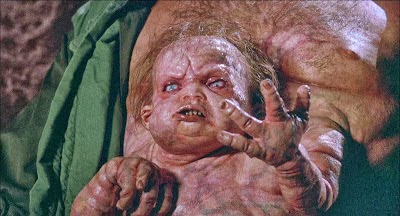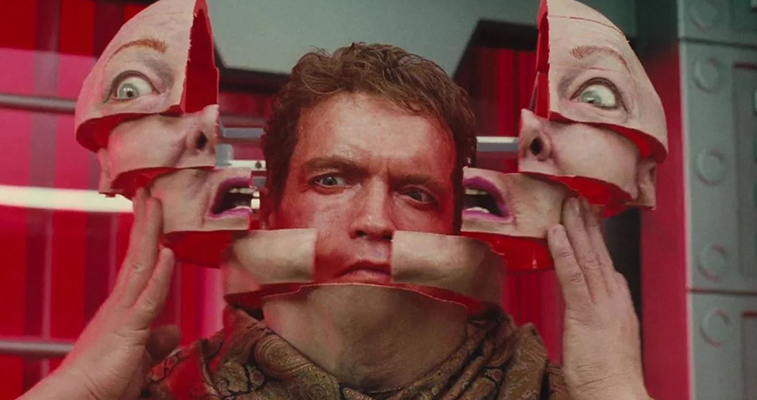[7]
Arnold Schwarzenegger stars in this high-concept futuristic actioner about a blue-collar man who pays to have memories of a Mars vacation implanted in his memory — the next-best thing, and a cheaper alternative, to actually going there. But the procedure ends up triggering deeply buried memories of his time as a freedom-fighter on Mars, fighting against an evil corporation who owns and controls the most precious resource on the planet — air. Arnold spends the entire film running from the company while trying to solve the film’s central mysteries: Who is Arnold’s character really? And what company secret is buried in his memory that threatens their existence?
It’s taken me decades to appreciate Total Recall. I saw it upon its initial release in 1990 and a handful of times since, and I only ever felt indifferent to it. I think it’s because Schwarzenegger, despite his star power, doesn’t give a very good performance in the film. He fails to capture the sympathy, insecurity, and vulnerability of a man suffering from amnesia. At times his performance is even cringe-worthy. I’ve also never been a fan of the production design. Even though I know production company Carolco Pictures spent a fortune on the film, many the sets have always looked cheap and unconvincing to me.
But after watching the film again (in 2025), I was surprised to find myself absorbed by the film’s plot mechanics. I’d always overlooked the merits of the tightly-wound screenplay by Alien scribes Dan O’Bannon and Ronald Shusett (based on a novelette by Philip K. Dick). The script generates some well-executed plot twists and does a terrific job obscuring the ulterior motives of several characters — who can Schwarzenegger trust? There is more than one betrayal, and all through the film his character wrestles with whether or not he can even trust himself.
I especially enjoy the depiction of a ‘wild west’ type village in the Mars settlement called Venusville, where mutants (warped by Martian radiation) live and work alongside non-mutants in bars, gambling, and sex-worker establishments. This is where Schwarzenegger meets a woman with three breasts, obviously one of the film’s most indelible images. It’s also where he comes into contact with an old flame and fellow freedom-fighter he doesn’t remember (Rachel Ticotin), as well as the leader of the resistance, a terrifically executed mutant known as Kuato (Marshall Bell).
The film’s other MVPs include a pre-stardom Sharon Stone as Schwarzenegger’s wife on Earth, who gets to play both sexy vixen as well as deadly fighter. Michael Ironside is more than reliable as a cut-throat agent of the company, and it’s always good to see Ronny Cox in a movie — even if his depiction of the evil CEO is essentially a retread of what he did in RoboCop a few years earlier. Legendary makeup-effects artist Rob Bottin (Legend, The Thing) delivers some of the most life-like practical effects ever put to film in Total Recall, including some gruesome closeup shots of various characters suffering in the oxygen-deprived Mars atmosphere — skin bulging and eyes literally popping out of their heads. Composer Jerry Goldsmith is perhaps the most compelling contributor of all, delivering a pulse-pounding score sprinkled with moments of mysticism and ecclesiastic revelation. It’s one of the finest scores of his illustrious career.
Dutch director Paul Verhoeven (RoboCop, Basic Instinct) delivers a film very much in line with his proclivities — a hard ‘R’ smorgasbord of non-stop action that pushes the limits of how much sex and violence was socially acceptable in a studio movie at the time. Total Recall was one of the films that caused the government to threaten intervention in Hollywood’s long (and still) maintained self-government, forcing the studios and the Academy of Motion Pictures to reign things in moving forward. The hey-day of ’80s hard-R blockbusters came to an end after Total Recall. PG-13 would become the new norm, making Total Recall (along with the same year’s ultra-violent RoboCop 2) noteworthy historical markers in the evolution of American film – much the same way Gremlins and Indiana Jones and the Temple of Doom brought about the shift of preference from PG to PG-13 in the mid-80s.
Academy Award: Special Achievement in Visual Effects
Oscar Nominations: Best Sound, Best Sound Effects Editing


